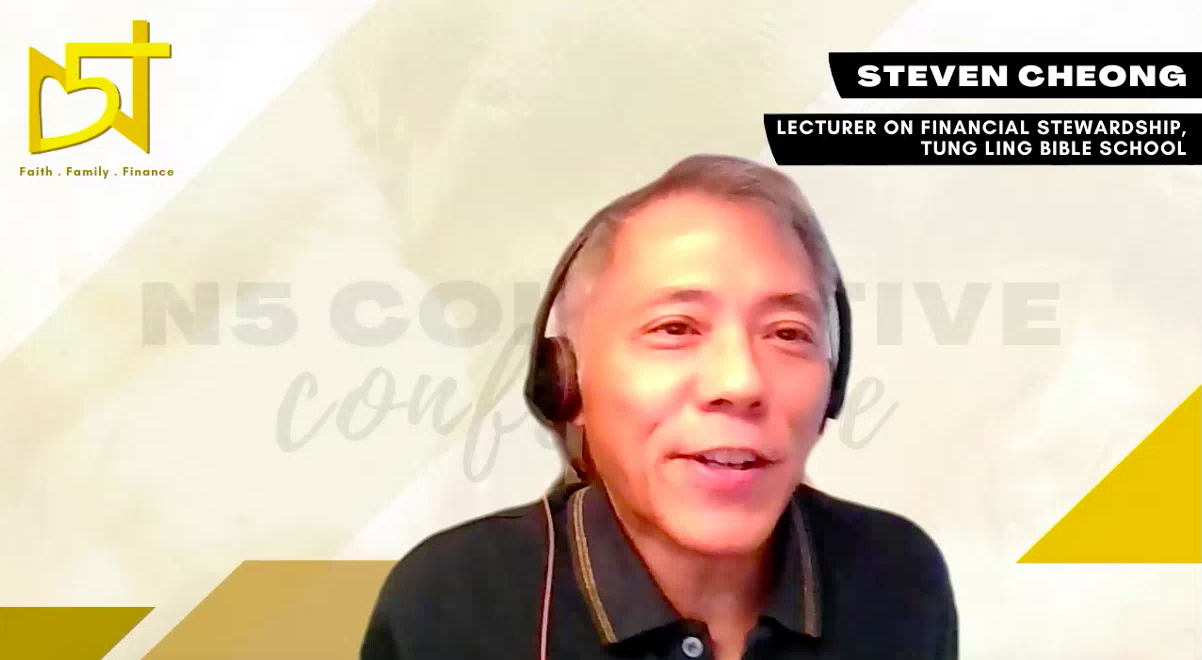“We are to be faithful with, not just 10%, but 100%”: A challenge to rethink biblical giving
by Gracia Lee // November 24, 2021, 11:05 pm

Tithing is only the starting point of Christian giving, says Steven Cheong, lecturer of financial stewardship at Tung Ling Bible School. “It’s the floor, not the ceiling to our giving.” Photo by Annie Spratt on Unsplash.
If you were to look at your spending, what is the bulk of your money spent on? How does the amount spent on your wants compare to what you spend on others?
“The object of our affections is apparent where we channel the most of our resources,” said Steven Cheong, a lecturer on financial stewardship at Tung Ling Bible School. “Do we have a treasure which has a higher priority than God?”
Steven, who spent 15 years in investment banking and another 15 years as head of mergers and acquisitions at a listed engineering group, posed these hard questions during last month’s N5 (Nehemiah 5) Conference, which aimed to equip believers to steward personal financial resources God’s way.
Challenging participants to examine their spending habits, Steven listed several questions that we can ask ourselves:
- Do we spend more on our wants, such as luxury goods, art collections and hobbies, than what we give to others?
- Do we give only after we are done with our spending, so that our gift looks more like some leftover change?
- Do we give only when we see some great need?
- Do we spend more money renovating our homes than building the Lord’s house (for instance, by giving to the church building project)?

There is a direct correlation between our faithful handling of worldly wealth and God’s decision to entrust us with His future kingdom, said Steven, during his 45-minute talk on financial stewardship.
During his 45-minute talk, he dug into Scripture and challenged participants to rethink their understanding of biblical giving, as well as debunked common misconceptions on tithing.
Basic principles, eternal implications
To lay the foundation, Steven provided four biblical principles to shape our view on our money and resources.
1. Everything belongs to God
The earth is the Lord’s, and everything in it,
the world, and all who live in it; (Psalm 24:1)
The Bible is clear that God owns everything, said Steven – all that is in heaven and on earth (Deuteronomy 10:14), the land (Leviticus 25:23), every animal, every creature (Psalm 50:10-12), silver and gold (Haggai 2:8).
“Since God owns the universe, that means he owns you and me. And that includes, by reason, everything that is in our possession,” he added.
2. We are God-appointed stewards
“Again, it will be like a man going on a journey, who called his servants and entrusted his wealth to them. To one he gave five bags of gold, to another two bags, and to another one bag, each according to his ability. Then he went on his journey … After a long time the master of those servants returned and settled accounts with them.” (Matthew 25:14-15; 19)
Since God owns everything, we are not owners of the resources that we possess. Instead, we are merely stewards to whom God has entrusted His wealth, said Steven.
He added that we are to manage these assets for God’s benefit, and every one of us will one day have to give an account of how we have handled what He has entrusted to us.
3. Our primary goal as stewards is to be found faithful by God
Now it is required that those who have been given a trust must prove faithful. (1 Corinthians 4:2)
How do we prove ourselves faithful?
“By using our God-given resources like money, time and opportunities to accomplish the tasks He delegates to us for the purpose of furthering His kingdom,” said Steven.
To do so, we have to regularly check in with God, ask Him to reveal to us what He would like us to do with our money and possessions, and obey whatever He directs us to do, he added.
“We are to be faithful with not just 10%, but with 100%,” he said.
4. Our faithful handling of worldly wealth has eternal implications
“‘Well done, my good servant!’ his master replied. ‘Because you have been trustworthy in a very small matter, take charge of ten cities.’” (Luke 19:17)
We are “eternal beneficiaries of our present day giving”, as there is a direct correlation between our faithful handling of worldly wealth and God’s decision to entrust us with His future kingdom, said Steven.
“God pays a great deal of attention to the little things we do. What we do with the little time, the little talents and the little money shows him whether he should promote us, commend us or demote us in His kingdom operations,” he added.
“Each gift that we bring to the Lord is a deposit into His heavenly account. It becomes heavenly treasure where moth and rust do not destroy, and it will last for eternity.”
Tithing is the floor to our giving
Given these principles, it is no wonder that giving has always been an important thing to do for God’s people, as seen in both the Old and New Testament.
“Each gift that we bring to the Lord is a deposit into His heavenly account.”
In the Old Testament, the Israelites had to give a Levitical tithe (Leviticus 27:30; Numbers 18:21-26), a Festival tithe (Deuteronomy 14:22-27; Deuteronomy 16:16) and a Welfare tithe once every three years (Deuteronomy 14:28-29). This made a total of 23.3% of their yearly income.
In the New Testament, tithing was not specifically rejected nor endorsed. Instead, the Church is taught to give out of love, and they are to do so intentionally, willingly, cheerfully and generously (2 Corinthians 9:7; 11).
Examples abound of such giving: Zacchaeus gave 50% (Luke 19:8), the poor widow gave 100% (Mark 12:41-44), the early church shared all they had (Acts 4:32-35), and the Macedonian church gave generously in spite of their extreme poverty (2 Corinthians 8:1-5).
“In the New Testament, there are actually no limits to how much we should give,” said Steven, adding that he believes tithing is only the starting point of Christian giving. “It’s the floor, not the ceiling, to our giving.”
Costly sacrifice
So, how we should give?
Since there is no clear biblical guideline on the amount or proportion of our income to give, we are the ones who have to determine the sum (2 Corinthians 9:7), said Steven, who agreed with his wife to give away 29% of their income.
“There is a bigger sacrilege we commit all the time – that is to take something and give it to God when it means absolutely nothing to us.”
We are to give according to our ability (2 Corinthians 8:12) and in proportion to what we earn (1 Corinthians 16:2), he added. Those who have been blessed with more are thus expected to give more (Luke 12:48; 1 Timothy 6:17).
During the Q&A segment, Steven added that what we earn should include not just our salaries but also our gains from investments, sales of property, interest or inheritance, as all these come from God.
He also stressed that our tithes should go to our local church, as it is “holy and sacred” for the Lord (Exodus 23:19).
“Let’s not break up our tithe into portions that we want to channel outside the church, because truly your pastors need to be fed … The church machinery needs to be supported, and the tithe is the starting point for that,” he said.
Steven also cautioned against giving token sums that do not mean much to us.
Quoting the late British evangelist and preacher G Campbell Morgan, he said: “Sacrilege is often defined as taking something that belongs to God and using it profanely. But there is a bigger sacrilege we commit all the time – that is to take something and give it to God when it means absolutely nothing to us.”
“I will not sacrifice to the Lord my God burnt offerings that cost me nothing.”
He cited the example of King David in 2 Samuel 24:18-25 who declined Araunah the Jebusite’s offer to give his land to David, so that the latter could build an altar to God.
King David had said: “No, I insist on paying you for it. I will not sacrifice to the Lord my God burnt offerings that cost me nothing.” (2 Samuel 24:24)
Similarly, Steven pointed out how Jesus in Mark 12:41-44 commended the poor widow who gave all she had, though it was only two copper coins, instead of the rich who had given out of their wealth.
“For the vast majority of people who had come to the treasury, there was no sacrifice involved at all. Their gifts hardly cost them anything. This poor widow, on the other hand, had nothing to spare. But what she had, she gave … Jesus said to the disciples that the widow had given more than anyone else.”
Hurdles to generous giving
Nevertheless, Steven acknowledged that there are things that can hold us back from generous giving, such as overspending habits, fear of the future and being in debt.
He encouraged those who often spend beyond their means to revaluate their expenses and adjust their lifestyle accordingly. “Seek contentment, declutter and live below your means so you can make room to give in a manner that is pleasing to God,” he said.
“Be encouraged that as we exercise our stewardship role in love and obedience to His word, he can be trusted to provide and take care of us.”
For those who struggle with fear of the future, he urged: “Take heart that our Abba Father is our Jehovah Jireh. Be encouraged that, as we exercise our stewardship role in love and obedience to His Word, he can be trusted to provide and take care of us.”
As for those who are trapped in financial debt, he challenged them to continue giving as they work toward clearing their debts.
“When we continue to give God the first and the best of our finances that we receive, we are effectively saying to Him: I recognise your ownership and trust you to bless my obedience. God is never indebted to anyone. He will bless us for our obedience and sacrifice,” he said.
Bernard Lim, who founded the N5 Conference, jumped in to testify to God’s faithfulness as he shared about the time he had fallen into debt after making poor investment decisions.
Despite his circumstances, he and his wife both agreed to continue honouring the Lord with their tithe.
“Whatever income that was coming in, and even though we had bills to pay, it was one thing that we kept to … There was no question about it,” said Bernard, a former Prudential financial services director.
He encouraged those in similar situations to trust in God’s Word, which says that He will “rebuke the devourer for you, so that it will not destroy the fruits of your soil, and your vine in the field shall not fail to bear” (Malachi 3:11).
Bernard’s finances have since been restored. He said: “Whatever it is, even if it doesn’t go your way, just remember that the Lord remembers it and He will redeem you in ways you can never, ever imagine.”
MORE FROM THE N5 CONFERENCE:
Banking head honcho now works with villagers and ex-convicts
Banking head honcho now works with villagers and ex-convicts
We are an independent, non-profit organisation that relies on the generosity of our readers, such as yourself, to continue serving the kingdom. Every dollar donated goes directly back into our editorial coverage.
Would you consider partnering with us in our kingdom work by supporting us financially, either as a one-off donation, or a recurring pledge?
Support Salt&Light


